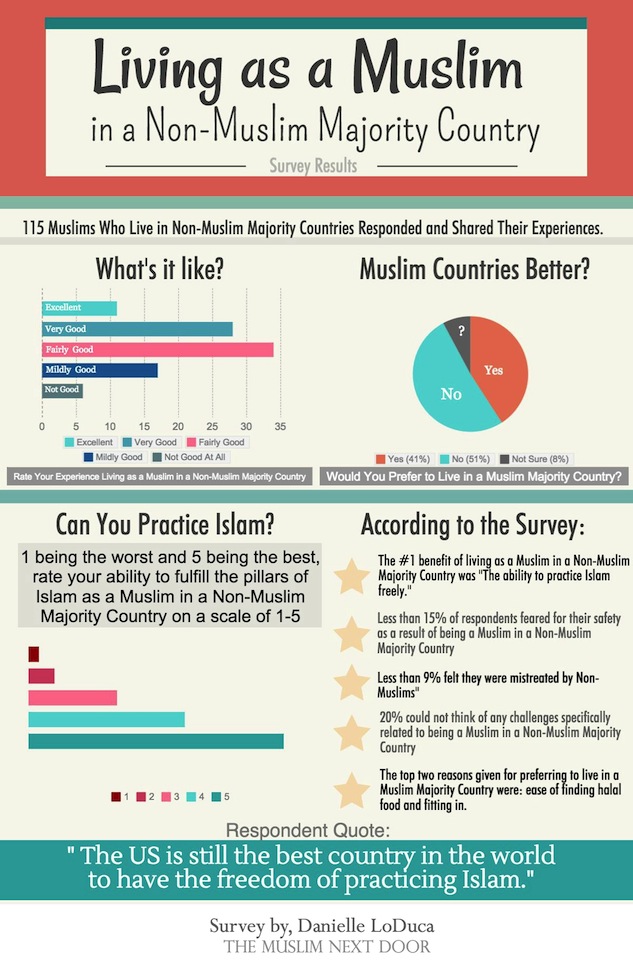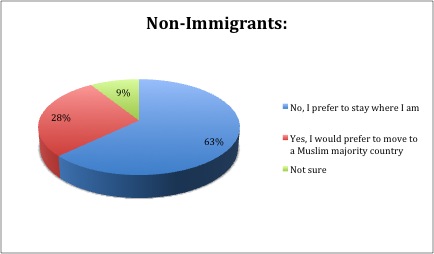What’s it like, being a Muslim in a Non-Muslim majority country? Is it hard?
Can you actually practice Islam and grow in faith and deeds?
Is it distracting, with temptations constantly pulling you away from remembrance of Allah?
Are you hated, mistreated?
I’m a Third Generation American
America is my home and although I’ve had some daydreams of living in a Muslim society, I could not see myself leaving my homeland except under extreme circumstances.
Not only do I feel comfortable and truly at home here, where I understand the culture, language and systems. I also feel a care and responsibility towards my fellow Americans.
My life serves as an example of the practice of Islam within the American cultural construct. I believe it is important for Americans to know that a familiar, American girl-next-door can also be a devout Muslim.
Through this survey I was able to test if other Muslims living in Non-Muslim majority countries feel as I do.
The results were very intriguing and enlightening. Through these results we can better understand the benefits and challenges of living amongst non-Muslims and gauge the effects on one’s Islam.
 |
Sample
To better understand the results, here’s a breakdown of the sample demographics:
– 115 Muslims responded to my survey: Living as a Muslim in a Non-Muslim Majority Country.
– 71% of the respondents were women.
– Nearly half of all respondents were converts to Islam.
– Nearly 40% of respondents grew up practicing Islam. The remaining 10% were born to Muslim families, but began practicing later in life.
– 25% of respondents immigrated to their current countries, while the remaining 75% were born in their respective non-Muslim majority countries.
– More than 91% of the respondents reported that they are visibly recognizable as Muslims.
– 47% have been practicing Islam for more than 10 years, 17% between 5-10 years and about 36% have been practicing Islam for 5 years or less.
Results & Analysis
This survey revealed that a multitude of Muslims who live in Non-Muslim majority countries feel comfortable in their respective lands.
When asked to rate their experience living as a Muslim in a Non-Muslim majority country, the top answer was “fairly good” at 34%, followed by “very good” at 29%, followed by the more negative “mildly good” at 19%. 13% felt they have had “excellent experiences” and 5% said that their experience has been “not good at all”.
When respondents were asked, “If you were able, would you prefer to live in a majority Muslim country?” The results varied greatly depending on whether or not the respondents were immigrants.
Out of the entire group, 51% said they would not prefer to move to a Muslim majority country. But when I filtered the responses according to whether or not the respondents had immigrated to the non-Muslim majority country, I found that more immigrants would prefer to move to a Muslim majority country than Muslims who were born in non-Muslim majority countries.
The following graphs demonstrate this disparity.
 |
 |
Reasons to Move
The most common reasons stated for wanting to move to a Muslim majority country were, in order of prevalence:
1. To live in an environment more conducive to faith and practice
2. Ease of living, finding halal foods etc.
3. To raise children in a more wholesome environment
4. To not feel labeled or under scrutiny; to fit in.
The fact that more immigrants would prefer to move than non-immigrants may indicate that most people prefer to live in their familiar surroundings and feel most at home wherever they are born and raised.
Most of the non-immigrants who desired to move abroad to a Muslim majority country expressed hopes that they would feel accepted and be surrounded by Islamic values and brotherhood if they were to live in a Muslim land.
Although few, some have had negative experiences such as this American convert who explained her reason for not wanting to stay in the US:
“I am treated completely different than I was before I converted. The Muslims in America don’t want you to be a Muslim and seem to make every effort to out you. Your own family and friends feel alienated by your new lifestyle and your own people hate you since they are taught to hate Islam. You have to live as if you are on an island and who can endure that? I have found the most accepting Muslims are Muslims from the Middle East.”
Reasons Not to Move
The most common reasons given, for not wanting to move to Muslim majority countries are as follows:
- Muslim countries have their own problems: too much oppression/ do not follow Islam correctly and impose restrictions accordingly/ feel more freedom to practice Islam in my own country
- I feel at home and love where I am
- There is work to be done in my country (dawah). I feel I am a stronger Muslim by overcoming the challenges that come with living amongst non-Muslims.
One respondent, echoing the sentiments of many others, stated, “There are more restrictions (in Muslim majority countries), not following the Quran and Sunnah. The US provides opportunity to follow the deen correctly.”
Another said, “Because I am a convert, I find it easy to feel I belong in the US. I feel strongly that I should live here and be a good example to my fellow citizens. I don’t have to live in a foreign environment to be a Muslim.”
Converts
Sadly several respondents who are converts expressed disillusionment with the Muslim population; one of them stated frankly, “Muslims are mean.” Another said, “My non-Muslim friends are much kinder and more trustworthy (than the Muslims I know).”
Even if such experiences are few, we should take heed and realize that we need to rectify ourselves as a community, not only to be more kind and welcoming, but at the heart of this problem is that our practice of Islam is inadequate.
We are not good callers to the deen of Allah if people who choose to enter Islam find the Muslims so repulsive – after meeting some of us. This is not what Allah wants from us and it is not the way of the Prophet Muhammad (peace be upon him).
When asked to choose the positive aspects of living in a non-Muslim majority country, 57 respondents selected: “I have the freedom here to live and practice my faith as I choose” 58 selected “It gives me the opportunity to share Islam with others who don’t know about it.”. Only 6 people chose “I can’t think of any benefits.”
Challenges
After listing the positive aspects of living in a Non-Muslim majority country, respondents were asked to name the challenges specifically related to living as a Muslim in a non-Muslim country.
The largest number of respondents (20%) chose “I can’t think of any challenges”, both “I feel I have a hard time finding/keeping a job due to discrimination” and “I fear for my safety” tied at under 15% each.
11% said that their relationships with family and friends have been strained due to their choice to practice Islam. 4% felt they were not treated well by non-Muslims, and 5% felt they were mistreated.
The majority of respondents have no problem fulfilling their obligations to Allah as a Muslim despite living in a non-Muslim majority country. One respondent remarked about this and said, “It can be a challenge at times, but I feel that the challenge only brings you closer to Allah. Being in a non-Muslim society… I am pushed on a regular basis to be the best Muslim and person I can be. We are representatives of Islam and have to be a good part of society.”
Culture vs. Islam
Cultural understanding plays its own role, as one respondent commented. “Living Islam isn’t hard (in a non-Muslim majority country) as long as we respect other faiths and their views.”
What I found interesting was that so many respondents, most of whom have not actually lived abroad, had very negative perceptions of Muslim majority countries, regarding both the political and social climates. They cited repression, oppression, bidaa (innovation in matters of religion), culture indistinguishable from Islam, uncleanliness, bad manners and attitudes, and more.
I can’t be sure whether or not these perceptions are based on reality or, if they are at least in part, manufactured much like the negative perception of Islam due to media representation among other things.
I hope that these results provide insight and also serve to strengthen all of us in our growth as believers.
May Allah guide us and keep us steadfast upon the straight path.
Ameen.
(From Reading Islam 2016 archives)